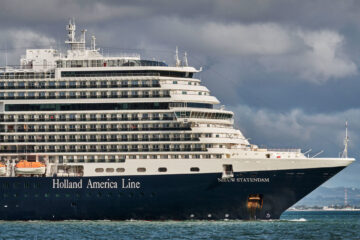Edward Norton Lorenz saw the connection.
Lorenz, founder of the branch of mathematics known as modern chaos theory, believed that when a butterfly flutters its wings in one part of the world, it can eventually cause a hurricane in another.
Related: Analyst resets Tesla stock price target ahead of Q3 deliveries
The theory might sound a little funky for everyday people, but analysts see it playing out in the auto sector. A butterfly flapping its wings in China is blowing a mighty wind through carmakers on the other side of the globe.
As of this year, China is the world’s largest market both in terms of automobile sales and ownership, and that growth is closely tied to the country’s economic development and the rise of the middle class.
Chinese auto exports have increased from roughly one million to two million between 2020 and 2021 to reach almost 5 million last year, according to Statista, which cited data from the China Association of Automobile Manufacturers.
In 2023, China overtook Japan as the world’s largest car exporter, and the increased export numbers contributed to the growing demand for electric cars, the BBC reported.
Elon Musk’s Tesla (TSLA) has been jockeying with China’s BYD (BYDDY) for the crown as the top electric-vehicle maker.
BYD, by the way, saw its 9 millionth new energy vehicle model roll off the production line on Sept. 25. The company produced its latest one million vehicles in less than three months, and has launched three models in Kenya.
Analysts are revising their price targets for some major automakers.. (Photo by Bill Pugliano/Getty Images)
Bill Pugliano/Getty Images
Analysts take hard look at Ford, GM, Rivian
Meanwhile, the U.S. Commerce Department proposed to ban key Chinese software and hardware in connected vehicles on American roads due to national security concerns. Such a move would effectively bar Chinese cars and trucks from the U.S. market, Reuters reported on Sept. 23.
The regulations would also force American and other major automakers in years ahead to remove key Chinese software and hardware from vehicles in the U.S.
Related: Analysts weigh in on Ford, praise Tesla
A Commerce Department official told Reuters that General Motors (GM) and Ford (F) would need to stop importing vehicles to the U.S. from China under the proposed rule.
GM sells the Buick Envision and Ford sells the Lincoln Nautilus — both assembled in China — in the U.S. market. In the first six months of 2024, GM sold about 22,000 Envisions and Ford sold 17,500 Nautilus SUVs in the U.S.
In response, China urged the U.S. to stop “unreasonable suppression” of its companies, with a Commerce Ministry official saying “the U.S. move has no factual basis, violates the principles of market economy and fair competition, and is a typical protectionist approach.”
Analysts at Morgan Stanley have been tracking the Chinese butterfly’s movements and issued a research report adjusting the price targets of some U.S. car marketers.
“The China capacity ‘butterfly’ has emerged and is flapping its wings.” the investment firm said in a note to investors. “China produces 9 million more cars than it buys, upsetting the competitive balance in the West.”
Among other actions, Morgan Stanley downgraded Ford to equal weight from overweight, while cutting its price target on the stock to $12 from $16.
Firm: ‘Tariffs will work for a bit but not for long’
The firm dropped General Motors to underweight from equal weight and slashed the automaker’s price target to $42 from $47. And it downgraded electric-vehicle maker Rivian (RIVN) to equal weight from overweight and cut the price target to $13 from $16.
“[We] downgrade legacy OEMs and select suppliers who are more vulnerable to increased China competition (export markets and domestically) and [the] resulting share loss, passing through peak earnings, regulatory compliance risk, and increased calls on cash to remain relevant” in the advanced-driver-assistance market, Morgan Stanley said.
More Automotive:
Analysts praise groundbreaking Tesla rival, preview robotaxi eventLatest federal pitch might steer Chinese cars off US roads2025’s best hybrid cars: Toyota, Hyundai and more
Conversely, the firm said it was upgrading the franchise-dealer complex, which within the auto industry value chain is most levered to stronger U.S. states and the high end consumer with limited exposure to the Detroit Big Three.
China accounted for 29% of global auto sales in 2023 and 32% of production, the firm said, and “we estimate well over 40% of global auto capacity (China at approx. 50% capacity utilization).”
Related: Analyst shifts General Motors stock price target on earnings data
“Tariffs will work for a bit but not for long, and there will likely be retaliation and indirect pressure,” Morgan Stanley said. “China-made EVs continue to expand into export markets, rivaling global peers with superior affordability, variety and (increasingly) quality while competition in domestic markets has also eaten into Western legacy [original-equipment-manufacturer] share.”
At a high level, the firm said its downgrade was driven by a combination of international, domestic and strategic factors that “we believe may not be fully appreciated by investors.”
“Even if these units don’t end up directly on US shores, the ‘fungibility’ of lost share and profit by key US players adds pressure here at home,” Morgan Stanley said.
Capital spending is falling at the margin, but OEMs struggle with recently added EV capacity, potentially noncompetitive costs and uncertain demand.
Stock buybacks “have worked this year (GM best-performing OEM year-to date), but we believe these will eventually end,” the firm said.
Related: Veteran fund manager sees world of pain coming for stocks


